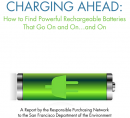Batteries
Rechargeable batteries can now be used for almost any purpose except certain sensitive electronic devices or situations where longevity is critical, such as emergency equipment. The technology has improved.
Our battery cut sheet (updated Aug. 2022) identifies best-performing product names for AA, AAA, C, D, and 9V rechargeable batteries. For background information on rechargeable batteries, see RPN's 2016 report.
Info on this product category: Batteries
Why Go Green
All used batteries - whether rechargeable or not - must be recycled, not disposed in the trash. Because one rechargeable battery can replace hundreds of non-rechargeables, the waste impact is reduced dramatically. Older nickel-cadmium rechargeables - still sometimes found in power tools - have considerably more toxic heavy metals.
Criteria for Batteries
AA Nickel-metal hydride rechargeable batteries:
- Minimum 2,500 mAh capacity
- Low self-discharge (LSD): Maintains a minimum of 80% capacity after 1 year in storage, or 75% after 3 years in storage
AAA Nickel-metal hydride rechargeable batteries:
- Minimum 800 mAh capacity
- Low Self-Discharge: Maintains a minimum of 80% capacity after 1 year storage, or 75% after 3 years storage
C Nickel-metal hydride rechargeable batteries:
- Minimum 5,000 mAh capacity
- Low Self-Discharge: Maintains a minimum of 80% capacity after 1 year storage, or 75% after 3 years storage
D Nickel-metal hydride rechargeable batteries:
- Minimum 10,000 mAh capacity
- Low Self-Discharge: Maintains a minimum of 80% capacity after 1 year in storage, or 75% after 3 years in storage
9V Nickel-metal hydride rechargeable batteries:
- Minimum 175 mAh capacity
- Low Self-Discharge: Maintains a minimum of 80% capacity after 1 year storage, or 75% after 3 years storage
Non-rechargeable alkaline batteries are acceptable for precision electronic equipment that is voltage sensitive, for emergency use equipment, or for other applications requiring longevity and slow power drain.
Recycling
- Vendors that have contracts to sell batteries to the City must collect and recycle them free of charge.
Last updated
Reports
Charging Ahead: How to Find Powerful Rechargeable Batteries that Go On and On. 2016. A Report by the Responsible Purchasing Network to the San Francisco Department of the Environment recommending specifications for AA, AAA and D-sized rechargeable batteries for San Francisco’s SF Approved Program.
View the report and the spreadsheet summary of products (Appendix C).
Guide for City Staff
Recycling Instructions
Vendors that have contracts to sell batteries to the City must collect and recycle them free of charge. You can get free bins from the current City contracted office supply vendor.
Or get signs and bins and pay San Francisco Department of Public Health to pickup batteries and other toxic wastes that are not allowed in the trash.





